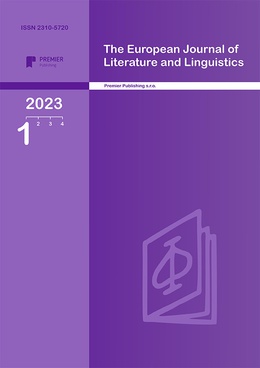СONCEPTIVE PECULIARITIES OF TOURISM TERMINOLOGY IN UZBEK AND ENGLISH
Authors
Gavharoy Isroiljon qizi

Share
Annotation
The article deals with the issues of understanding the terms of tourism terminology in lexical cognition, the largest type of cognitive linguistics, and their cognitive analysis. The cognitive aspect of understanding the terms of business tourism and complete exploration the field, the cognitive study of business tourism terms from the world experience is also an important step in the development of the industry and models of tourism language and language learning are presented. Understanding the term of tourism, when knowledge is interpreted as a cultural phenomenon, refers to the extent which this form of knowledge conforms to the norms inherent in the culture of a particular social group. The author analyzes the theory of social comparative advantages of tourism in conceptive context, the theories of outstanding western sociologists for the tourism analysis as social phenomenon. In this article the author analyzed the theory of social comparative advantages of tourism terminology and opportunities in Uzbek and English, learning the theories of outstanding western sociologists for the tourism analysis as social phenomenon.
Keywords
Authors
Gavharoy Isroiljon qizi

Share
References:
1. info@peopletravel.uz- All tour to Andizhan form people travel, 2018.
2. Barretto, M. (2008). Manual de Iniciação ao Estudo do Turismo (17th ed.), Campina: Papirus Editora.
3. Crouch, G. & Weber, K. (2002). Marketing of Convention Tourism. In K.
4. Davidson, R. & Cope, B. (2003). Business Travel. Conferences, Incentive Travel, Exhibitions, Corporate Hospitality and Corporate Travel. Harlow: Pearson Education Limited.
5. Palmer (Eds.), Tourism Research Methods: Integrating Theory and Practice (pp. 5-98). Wallingford: CAB International. DOI: 10.1079/9780851999968.0085.
6. Getz, D. & Page, S. (2016). Event Studies: Theory, research and policy for planned events (3rd ed.). London & New York: Routledge.
7. Kiss, K. (2014). The challenges of developing health tourism in the Balkans. Tourism, 63(1), 97-110.
8. Lage, B. & Milone, P. (2000). Turismo: teoria e prática. São Paulo: Editora Atlas.
9. Landeta, J. (2005). El metodo Delphi (1st ed. 1999). Barcelona: Ariel.
10. Linstone, H. & Turof, M. (1975). The Delphi method, techniques and applications. Reading: Addison- Wesley Publishing.
11. Moolman, H. & Wilkinson, A., Essential generic attributes for enhancing the employability of hospitality management graduates. Tourism, 2014, 62(3), 254-276.
12. Margues George, Norberto Santos, UNWTO. Measuring the Economic Importance of the Meetings Industry – Developing a Tourism Satellite Account Extension. Madrid, 2006.
13. Oppermann, M. (1996). Convention destination images: analysis of association meeting planners' perceptions. Tourism Management, 17(3), 175-182
14. Oppermann, M. & Chon, K. (1997). Convention participation decision-making process. Annals of Tourism Research, 21(1), 178-191
15. Rogers, T. (2008). Conferences and Conventions. A Global Industry (2nd ed.). Oxford: Butterworth-Heinemann.
16. Shone, A. (1998). The Business of Conferences: a hospitality sector overview for the UK and Ireland. Oxford: Butterworth-Heinemann.
17. Swarbrooke, J. & Horner, S. (2001). Business Travel and Tourism. Oxford: Butterworth-Heinemann.
18. Swarbrooke, J. & Horner, S. (2007). Consumer Behaviour in Tourism (2nd ed.). Oxford: Elsevier.
19. UNWTO (2006). Measuring the Economic Importance of the Meetings Industry – Developing a Tourism Satellite Account Extension. Madrid: Author.
20. UNWTO (2010). International Recommendations for Tourism Statistics 2008. Madrid: Author.
21.Weber, K. & Chon, K. (2002). Preface. In Weber & Chon (Eds.), Convention Tourism. International Research and Industry Perspectives (pp. ix-xiv). New York: The Haworth Hospitality Press.
22. Weber & K. Chon (Eds), Convention Tourism. International Research and Industry Perspetives (pp. 57-78). New York: The Haworth Hospitality Press
23. WTO (1991). Resolutions of the International Conference on Travel and Tourism. Madrid: Author.


